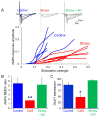An excitatory synapse hypothesis of depression
- PMID: 25887240
- PMCID: PMC4417609
- DOI: 10.1016/j.tins.2015.03.003
An excitatory synapse hypothesis of depression
Abstract
Depression is a common cause of mortality and morbidity, but the biological bases of the deficits in emotional and cognitive processing remain incompletely understood. Current antidepressant therapies are effective in only some patients and act slowly. Here, we propose an excitatory synapse hypothesis of depression in which chronic stress and genetic susceptibility cause changes in the strength of subsets of glutamatergic synapses at multiple locations, including the prefrontal cortex (PFC), hippocampus, and nucleus accumbens (NAc), leading to a dysfunction of corticomesolimbic reward circuitry that underlies many of the symptoms of depression. This hypothesis accounts for current depression treatments and suggests an updated framework for the development of better therapeutic compounds.
Keywords: glutamate; hippocampus; ketamine; nucleus accumbens; reward; stress.
Copyright © 2015 Elsevier Ltd. All rights reserved.
Conflict of interest statement
The authors declare they have no conflicting financial interests.
Figures





References
-
- Kessler RC, et al. Lifetime prevalence and age-of-onset distributions of DSM-IV disorders in the National Comorbidity Survey Replication. Arch Gen Psychiatry. 2005;62:593–602. - PubMed
-
- Belmaker RH, Agam G. Major depressive disorder. N Engl J Med. 2008;358:55–68. - PubMed
-
- Centers for Disease Control and Prevention. Suicide Facts at a Glance. 2009 Retrieved from http://www.cdc.gov/violenceprevention/pdf/Suicide_DataSheet-a.pdf.
-
- Gartlehner G, et al. Second-Generation Antidepressants in the Pharmacologic Treatment of Adult Depression: An Update of the 2007 Comparative Effectiveness Review. AHRQ Comp Eff Rev 2011 - PubMed
-
- Gaynes B, Warden D. What did STAR* D teach us? Results from a large-scale, practical, clinical trial for patients with depression. Psychiatry Serv. 2009;60:1439–45. - PubMed
Publication types
MeSH terms
Substances
Grants and funding
LinkOut - more resources
Full Text Sources
Other Literature Sources
Medical
Miscellaneous

